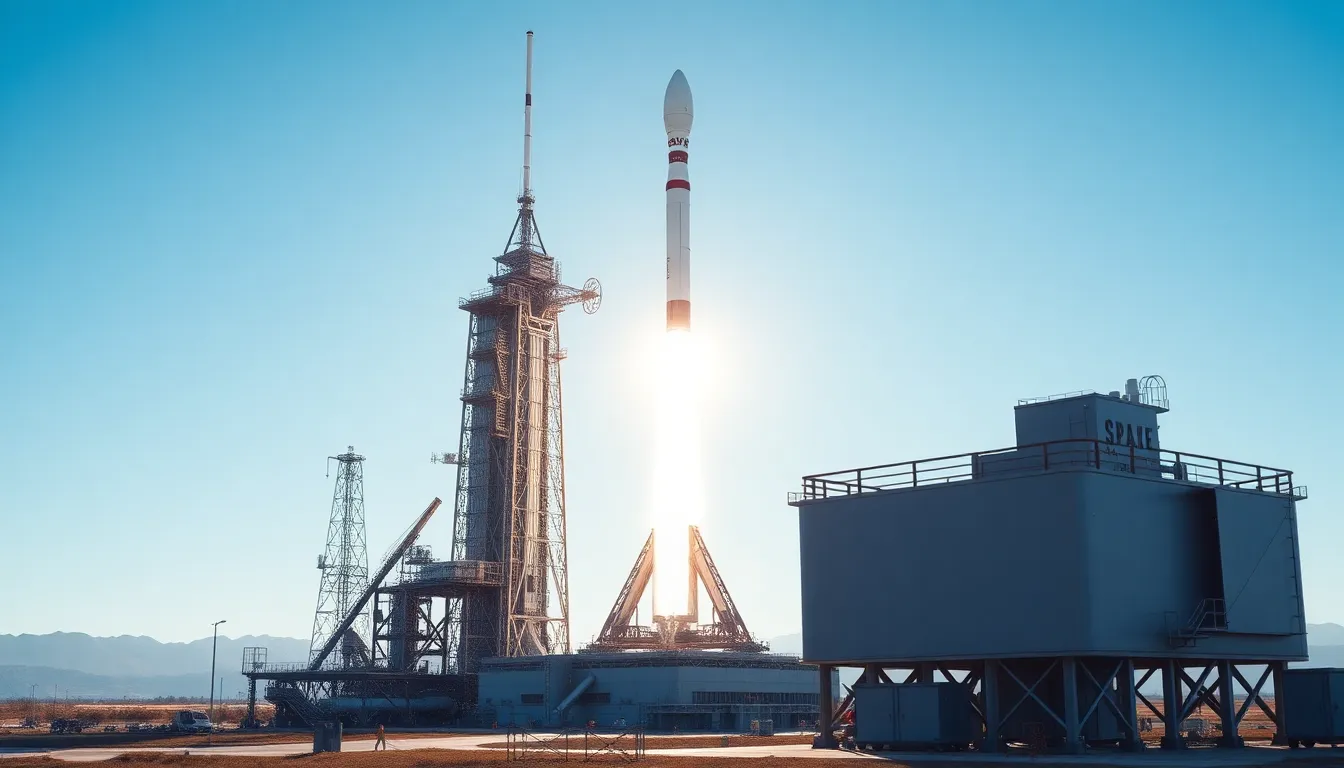In a world where reaching for the stars isn’t just a dream but a thriving industry, space technology companies are leading the charge. Forget the days of wishing on shooting stars; now, it’s all about rockets, satellites, and maybe even a vacation on Mars. These companies are not just launching vehicles; they’re launching humanity into a new era of exploration and innovation.
From SpaceX’s ambitious plans to colonize Mars to Blue Origin’s vision of space tourism, the competition is fierce and the stakes are high. With cutting-edge technology and a sprinkle of entrepreneurial spirit, these companies are redefining what’s possible. So buckle up and prepare for lift-off as we dive into the fascinating world of space technology and the companies that are making it all happen. After all, who wouldn’t want to be a part of the next giant leap for mankind?
Table of Contents
ToggleOverview Of Space Technology Companies
Space technology companies play a crucial role in developing and implementing innovations that shape the current landscape of aerospace exploration. Notable enterprises such as SpaceX and Blue Origin lead in rocket manufacturing and launch services. Both companies have achieved significant milestones, including reusable rockets that reduce costs and increase accessibility to space.
Other firms, like Rocket Lab and Virgin Galactic, contribute to satellite deployment and space tourism, expanding the commercial potential of low Earth orbit (LEO) ventures. Rocket Lab specializes in small satellite launches, providing an essential service for research and communication needs. Virgin Galactic focuses on suborbital space tourism, successfully conducting crewed flights that have garnered public interest.
Emerging startups are entering the field, introducing cutting-edge technologies that enhance satellite production and launch capabilities. Companies such as Relativity Space utilize 3D printing to optimize rocket manufacturing, aiming to streamline the building process and reduce waste. Planet Labs applies advanced imaging technology to monitor Earth’s surface, offering valuable data for environmental and agricultural applications.
Collaboration among these companies fosters innovation and competitiveness within the industry. Public-private partnerships with national space agencies, like NASA, enhance mission scope and funding opportunities, propelling advancements in technology and exploration efforts. Space technology companies increasingly focus on sustainability, developing green propulsion systems and promoting responsible use of space to minimize debris.
The combined efforts of established players and startups signify a vibrant and evolving sector. As aspirations for human habitation on the Moon and Mars grow, these companies are poised to connect humanity with the cosmos more profoundly than ever before.
Key Players In The Industry

The space technology sector features a diverse array of companies pushing the boundaries of exploration and innovation. Both established giants and emerging startups drive advancements that redefine humanity’s relationship with space.
Major Established Companies
SpaceX remains a frontrunner in rocket manufacturing and launch services, gaining attention for its reusable Falcon 9 rockets. Blue Origin also focuses on innovative technologies, exemplifying this through its New Shepard suborbital flights aimed at space tourism. Boeing collaborates with NASA on crew transportation technology for missions to the International Space Station (ISS), showcasing vital partnerships that enhance safety and reliability. Lockheed Martin contributes expertise in satellite systems and deep space exploration. These major players significantly influence industry standards, setting new benchmarks for performance and affordability.
Emerging Startups
Innovative startups are reshaping the landscape of space technology with fresh ideas and disruptive technologies. Rocket Lab specializes in small satellite launches, emphasizing rapid deployment capabilities. Planet Labs focuses on Earth imaging technologies, creating high-resolution satellite images for various applications. Relativity Space harnesses 3D printing to manufacture rockets, drastically shortening production timelines. Astra is gaining recognition for its compact launch vehicles aimed at democratizing access to space. These companies illustrate the dynamic nature of the industry, where creative solutions and agility enable them to address evolving challenges.
Innovations In Space Technology
Space technology continues to advance rapidly, driven by both established companies and innovative startups. These advancements encompass numerous areas, including launch vehicles and satellite technology.
Advances In Launch Vehicles
Rocket designs have evolved significantly, with companies like SpaceX leading the charge. They developed reusable rockets, particularly the Falcon 9, which redefines launch economics. Blue Origin also plays a crucial role, focusing on consistent suborbital flights to make space more accessible for research and tourism. Rapid iteration cycles enable startups like Rocket Lab to introduce new launch vehicles that accommodate smaller payloads effectively. Thus, the industry sees reduced costs and increased reliability, enabling more frequent missions. Various partnerships between private companies and government agencies, such as NASA, enhance innovation and expand capacities further.
Satellite Technology Developments
Satellite technology has transformed, enhancing communication and Earth observation capabilities. Noteworthy advancements include high-resolution imaging satellites from Planet Labs, which allow for real-time monitoring of environmental changes. Companies like Spire Global employ small satellites to gather vital data on weather patterns and maritime activity. Innovative companies such as OneWeb are also deploying large constellations aimed at providing global internet coverage. Enhanced propulsion technologies support these satellites, ensuring long-lasting deployments and improved operational efficiency. Startups and established firms continue to collaborate, pushing the boundaries of what is achievable in satellite technology and expanding its applications worldwide.
The Role Of Government Agencies
Government agencies play a pivotal role in fostering the growth of space technology companies. NASA, for instance, collaborates closely with private sector innovators, providing funding and access to its extensive resources. Their partnerships extend beyond traditional contracts, encouraging companies like SpaceX and Blue Origin to develop breakthrough technologies.
Funding from government programs propels various projects within the industry. In 2020, NASA awarded $2.6 billion to SpaceX and Boeing as part of the Commercial Crew Program, underscoring commitment to commercial space travel. Such investments stimulate innovation and create competitive markets that support emerging companies.
Regulatory frameworks established by government entities ensure safety and compliance in space operations. The Federal Aviation Administration (FAA) oversees launch licenses, which helps ease the path for startups launching satellites and conducting missions. Compliance with safety regulations is essential for maintaining public trust in an evolving industry.
International relations also play a significant part in the advancement of space technology. Agencies such as the European Space Agency (ESA) foster cooperation among nations, leading to joint missions that benefit various companies. Collaborative efforts enhance the prospects for shared technological advancements while promoting peaceful exploration in space.
Government initiatives often focus on research and development in areas critical for future exploration. The Artemis program, led by NASA, aims to land the first woman and the next man on the Moon by 2024, stimulating interest and investments from private enterprises. This push for lunar exploration catalyzes collaboration between government and industry, leading to revolutionary advancements in spacecraft design and technology.
Engagement with government agencies has empowered many startups in the space sector. The Small Business Innovation Research (SBIR) program, for example, provides critical funding for early-stage companies developing innovative technologies. By leveraging federal support, emerging players can tackle ambitious projects that contribute to humanity’s exploration of space.
Challenges Facing Space Technology Companies
Space technology companies encounter several challenges in their operations and growth. Funding remains a significant issue, as many firms rely on private investments and government contracts. Startups often struggle to secure sufficient capital to transform innovative ideas into reality.
Regulatory hurdles complicate the launch and operation of spacecraft. Compliance with strict safety standards set by the FAA and other regulatory bodies can delay project timelines and increase costs.
Competition intensifies the pressure for rapid innovation. Startups and established companies alike must balance speed with quality. Companies unable to keep pace may risk losing market share or facing bankruptcy.
Technological limitations pose additional obstacles. Developing reliable launch vehicles requires expertise in engineering and manufacturing, and errors can lead to costly failures. Fields like propulsion and materials science demand constant improvement.
Market demand fluctuates, affecting business stability. The commercial viability of space tourism and satellite services often depends on external economic factors. Companies must adapt their strategies to shifting customer interests and industry trends.
Lastly, talent acquisition is a critical challenge for these firms. Attracting skilled engineers, scientists, and industry experts can be difficult due to high competition and limited educational resources. Companies need to create compelling work environments that foster innovation and collaboration to retain talent.
Addressing these challenges is vital for the sustained growth of the space technology sector. Prioritizing solutions in funding, regulation, innovation, and workforce development can enhance the industry’s potential and drive future advancements.
The space technology industry is on the brink of a revolution. With established companies like SpaceX and Blue Origin leading the charge alongside innovative startups, the landscape is rapidly evolving. Their achievements in rocket reusability and satellite technology are not just milestones but gateways to new possibilities in exploration and commercial ventures.
As collaboration between private companies and government agencies continues to flourish, the potential for groundbreaking advancements grows. The challenges faced by these companies are significant but not insurmountable. By addressing funding, regulatory, and talent acquisition issues, the industry can pave the way for a future where humanity’s reach extends far beyond Earth. The journey into space is just beginning, and the excitement surrounding it is palpable.




